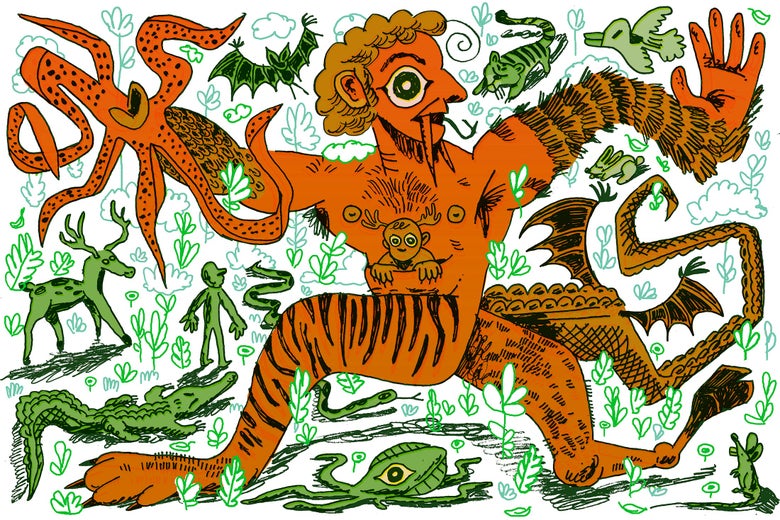Can a Human Get Pregnant From an Animal
Humanderthals!
We mated with Neanderthals. Can we breed with other animals, too?

Last week, scientists announced that the human gene pool seems to include DNA from Neanderthals. That suggests that humans interbred with their primate cousins at some point before the Neanderthals went extinct about 30,000 years ago. Could we mate with other animals today?
Probably not. Ethical considerations preclude definitive research on the subject, but it's safe to say that human DNA has become so different from that of other animals that interbreeding would likely be impossible. Groups of organisms tend to drift apart genetically when they get separated by geographical barriers—one might leave to find new food sources, or an earthquake could force them apart. When the two groups come back into contact with each other many, many years later, they may each have evolved to the point where they can no longer mate.
In general, two types of changes prevent animals from interbreeding. The first includes all those factors—called "pre-zygotic reproductive isolating mechanisms"—that would make fertilization impossible. After so many generations apart, a pair of animals might look so different from one another that they're not inclined to have sex. (If we're not even trying to mate with monkeys, we'll never have half-human, half-monkey babies. *) If the animals do try to get it on despite changed appearances, incompatible genitalia or sperm motility could pose another problem: A human spermatozoon may not be equipped to navigate the reproductive tract of a chimpanzee, for example.
The second type of barrier includes "post-zygotic reproductive isolating mechanisms," or those factors that would make it impossible for a hybrid animal fetus to grow into a reproductive adult. If a human were indeed inclined and able to impregnate a monkey, post-zygotic mechanisms might result in a miscarriage or sterile offspring. The further apart two animals are in genetic terms, the less likely they are to produce viable offspring. At this point, humans seem to have been separate from other animals for far too long to interbreed. We diverged from our closest extant relative, the chimpanzee, as many as 7 million years ago. (For comparison, our apparent tryst with the Neanderthals occurred less than 700,000 years after we split off from them.)
Researchers haven't pinned down exactly which mechanisms prevent interbreeding under most circumstances. Some closely related species can mate even if they have different numbers of chromosomes. Przewalski's horse, for example, has 33 pairs of chromosomes instead of the 32 most horses have, but it can interbreed with regular equines anyway—the offspring takes the average and ends up with 65 chromosomes.
Neanderthals weren't our ancestors' only dalliance with other primates. "Pre-humans" and "pre-chimpanzees" interbred and gave birth to hybrids millions of years ago. In the 1920s, Soviet dictator Joseph Stalin sent an animal-breeding expert to Africa in hopes of creating an army of half-man, half-monkey soldiers. Attempts both to inseminate women with monkey sperm and impregnate female chimpanzees with human sperm failed.
That doesn't mean that tales of humans interbreeding with other animals haven't endured. Rumored animal-human crosses from the past few hundred years have included a man-pig, a monkey-girl, and a porcupine man.
Got a question about today's news? Ask the Explainer.
Explainer thanks Trenton Holliday of Tulane University.
Correction, Nov. 15, 2006: Due to an editing error, the original version of this piece suggested that interbreeding humans and apes might produce half-human, half-monkey babies. The offspring of such a union would be half-ape, not half-monkey. (Return to the corrected sentence.)
Can a Human Get Pregnant From an Animal
Source: https://slate.com/news-and-politics/2006/11/can-humans-mate-with-other-animals.html#:~:text=Probably%20not.,interbreeding%20would%20likely%20be%20impossible.